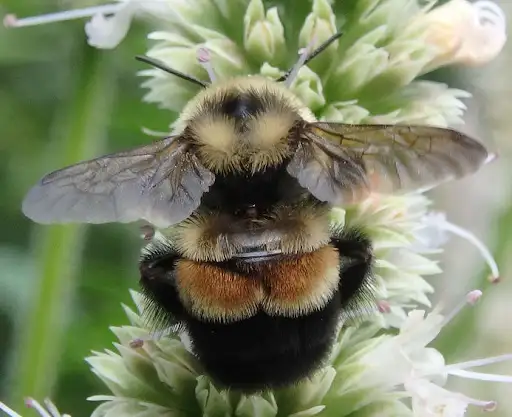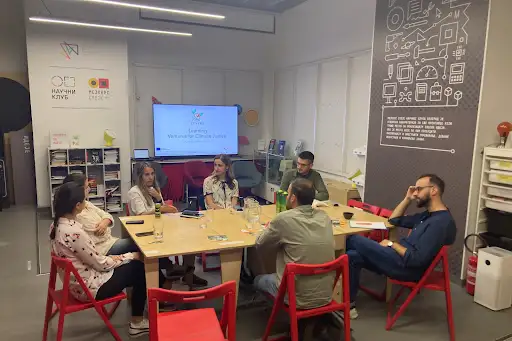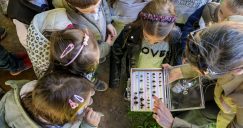Wild bee species, like bumblebees, face challenges from habitat loss, toxic pesticides, and climate change, while managed honeybees, despite beekeeper care, battle diseases, raising concerns about the fate of the world’s food crops that rely on pollinators. For instance, the rusty patched bumblebee, which saw an 87% decline in the past two decades, became the first bee listed as an endangered species in the US in 2017. The worrying trends indicate that this issue is not a future concern but a current one.

Therefore, through LEVERS, the Center for the Promotion of Science (CPN) formed a Serbian Learning Venture to facilitate education on multiple levels and raise awareness about the significance of climate justice through urban apiculture.
CPN has a long tradition of communicating scientific information to society. Through different topics such as art, science, technology, climate change, and many more, CPN has been successfully engaging society in science literacy. Through LEVERS, the Center aims to support local climate actions that connect education on urban pollinators and climate justice. These crucial topics, seemingly disconnected, actually go together when tackling climate change mitigation and adaptation. Biodiversity loss and food scarcity are grand risks that await if we don’t combat climate challenges that we all face.
Why are we doing this?
In 2021, according to the data of the Republic Institute of Statistics, there were 976,000 beehives in Serbia, and the total export of honey in 2021 amounted to 2,175 tons with a value of 13.1 million euros and was at the same level as the previous year. Serbia, therefore, represents a country of honey. However, beekeepers are not well represented in urban areas. With climate change effects, these numbers could drastically decrease in the following years. In order to preserve pollinator diversity, we need to transform the urban environments, make them more bee-friendly, and support climate actions to protect pollinator environments.
Which stakeholders are involved?
In order to encompass our goals and take action, CPN formed a team of stakeholders whose expertise lies in bee research, beekeeping, as well as urban botanics. Urban beekeeper communities, Faculty of Veterinary Medicine, Faculty of Biology, University of Belgrade, Secretariat for Environmental Protection, high schools, Belgrade botanical garden and businesses such as MadMed represent stakeholders and members of our core Learning Venture. With different and valuable perspectives, they each add a puzzle piece creating a stable path towards achieving our goals and objectives. Jointly, this Learning Venture will work towards creating an environment in Serbian urban areas where urban beekeeping takes a crucial place in fighting climate change while embracing climate justice.

Towards cultivating urban pollinator environments
We envision a future where we’ve undertaken transformative measures to create a more bee-friendly urban setting in Belgrade, and as a result, stakeholders at all levels are increasingly recognizing the critical role of urban pollinators in promoting biodiversity and advancing climate justice.
Although initially challenged in communicating the intricate relationship between pollination and climate justice, we hope to succeed in demonstrating to policymakers how the population of urban pollinators can yield significant benefits for the food industry, biodiversity and society as a whole. This achievement will be the result of collaborative discussions involving diverse stakeholders, which have equipped policymakers with a deeper understanding of the issue, enabling them to propose robust and effective solutions for a sustainable future.






